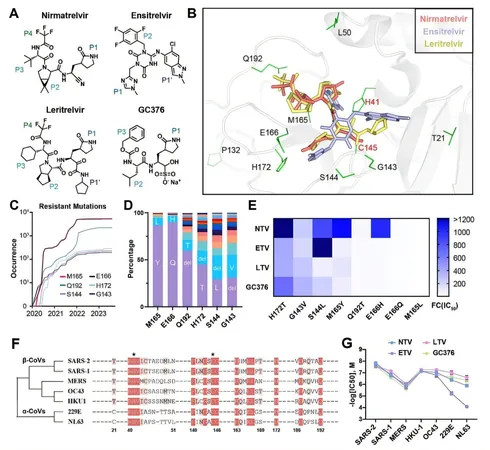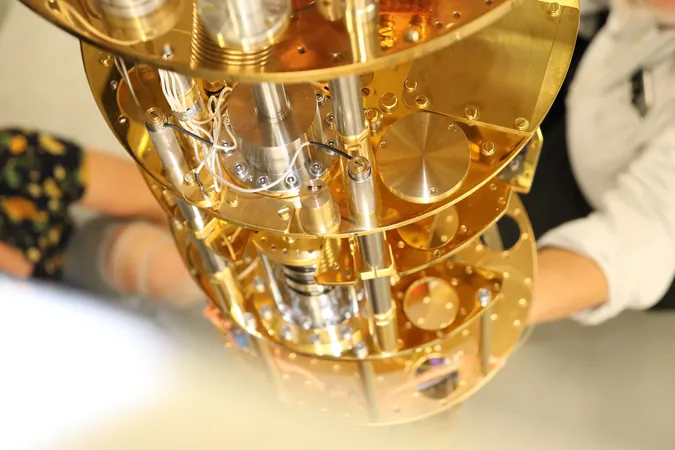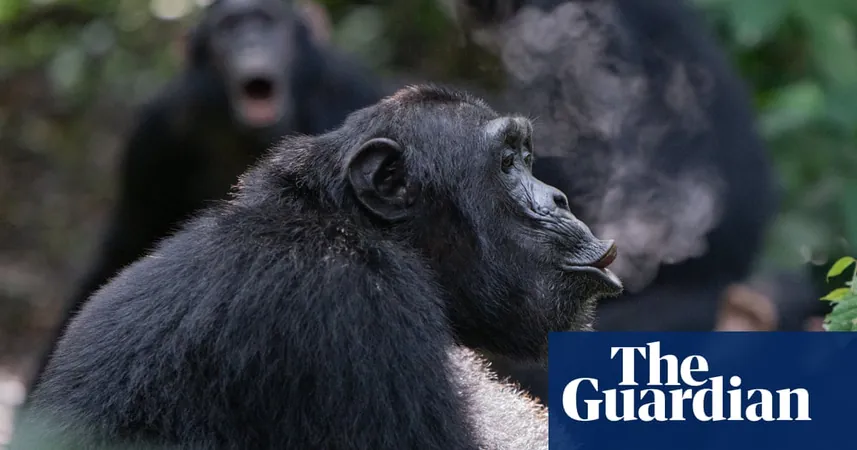
The Race Against Time: How New Drugs Are Targeting Evolving SARS-CoV-2 Variants
2024-11-06
Author: Arjun
Introduction
In recent years, the SARS-CoV-2 virus, the culprit behind COVID-19, has displayed a concerning ability to evolve. From the original wild-type strains to the now notorious omicron variant, the virus has transformed significantly, raising alarms among health authorities and scientists alike. The omicron variant is particularly alarming, as it shows a remarkable capacity to dodge the immune defenses provided by vaccines and monoclonal antibodies tailored for earlier iterations of the virus.
Targeting Mpro in Antiviral Drug Development
Central to the virus's replication and survival is the main protease, commonly referred to as Mpro, NSP5, or 3CL protease. This enzyme is pivotal in the cleavage and maturation of SARS-CoV-2 proteins within host cells, making it a prime target for the development of antiviral drugs.
Breakthrough with Nirmatrelvir (Paxlovid)
In 2021, the FDA heralded a breakthrough with the approval of nirmatrelvir (NTV), marketed as Paxlovid, becoming the first oral antiviral specifically designed to target Mpro. Initially hailed as a game-changer, concerns arose as some patients displayed mutations in their viral strain’s Mpro—specifically the E166V mutation—leading to resistance that rendered the virus up to 100 times less sensitive to NTV treatment.
Additional Mpro Inhibitors
In addition to Paxlovid, two other Mpro inhibitors have gained marketing approval: Ensitrelvir (ETV) and Leritrelvir (LTV). Notably, LTV, which received approval in China in March 2024, distinguished itself by not requiring concurrent use with ritonavir—a drug meant to enhance antiviral efficacy found necessary with some other treatments.
Ongoing Challenges and Research
However, the challenge persists: the effectiveness of these Mpro inhibitors against the myriad of emerging Mpro variants remains inadequately understood. To uncover crucial insights, a recent study led by researchers Nan Li and Xuefei Li at the Shenzhen Institutes of Advanced Technology sought to evaluate the inhibitory efficacy of these drugs against various SARS-CoV-2 variants and other coronaviruses. Their findings, published in the journal Quantitative Biology, represent a significant contribution to understanding antiviral treatments.
Study Insights
The researchers meticulously analyzed the chemical structures and binding modes of four key Mpro inhibitors. Notably, ETV is characterized as a non-covalent inhibitor, while NTV, GC376, and LTV utilize covalent inhibition. The interactions of these drugs with the Mpro enzyme differ—NTV and GC376 target the P1-P3 pockets, while ETV binds to the P1'-P2 pocket. Ingeniously, LTV employs a unique α-ketoamide warhead structure that ensures effective hydrophobic interactions with the P1' pocket, marking it as distinct from the nitrile-based warhead of NTV.
Mutation Hotspots and Drug Efficacy
Moreover, the study explored six hotspots within the Mpro protein that are prone to mutations. By leveraging global data from the GISAID database, they observed an alarming trend: a persistent increase in mutations at these critical sites over the years. Following this, the researchers purified the mutant Mpro protein using E. coli, enabling them to assess and compare the inhibitory activity (IC50) of the four drugs against both wild-type and mutant strains.
Results
The results were revealing. While NTV and ETV showed resistance against specific mutant enzymes, LTV exhibited remarkably robust inhibitory activity against both wild-type and mutant forms of Mpro. The implications of these findings are profound; LTV not only emerges as a more effective option than NTV and ETV against Mpro mutants but also holds promise as a broad-spectrum antiviral solution effective against different coronaviruses.
Testing Against Other Coronaviruses
To further complicate matters, the study also tested the drugs against Mpro from other pathogenic α- and β-coronaviruses that share genetic similarities with SARS-CoV-2. Here, LTV again proved advantageous, showcasing superior inhibitory capabilities across varied coronaviruses, while ETV showed limited impact.
Conclusion
As the fight against evolving SARS-CoV-2 mutants continues, the results from this study underscore the importance of ongoing research in tracking viral mutations and evaluating the in vivo efficacy of LTV. This not only paves the way for innovative therapeutic strategies but also rekindles hope in the battle against drug-resistant strains, essential in a world grappling with a pandemic that shows no signs of slowing down.
Future Directions
Stay tuned as the journey continues to discover effective treatments in the ever-evolving landscape of COVID-19.




 Brasil (PT)
Brasil (PT)
 Canada (EN)
Canada (EN)
 Chile (ES)
Chile (ES)
 Česko (CS)
Česko (CS)
 대한민국 (KO)
대한민국 (KO)
 España (ES)
España (ES)
 France (FR)
France (FR)
 Hong Kong (EN)
Hong Kong (EN)
 Italia (IT)
Italia (IT)
 日本 (JA)
日本 (JA)
 Magyarország (HU)
Magyarország (HU)
 Norge (NO)
Norge (NO)
 Polska (PL)
Polska (PL)
 Schweiz (DE)
Schweiz (DE)
 Singapore (EN)
Singapore (EN)
 Sverige (SV)
Sverige (SV)
 Suomi (FI)
Suomi (FI)
 Türkiye (TR)
Türkiye (TR)
 الإمارات العربية المتحدة (AR)
الإمارات العربية المتحدة (AR)